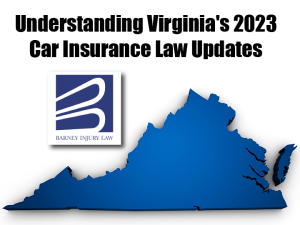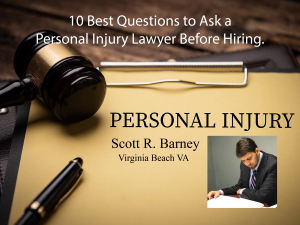Maximizing Compensation with a Skilled Accident Attorney: Your Guide
Accidents can happen at any time, leaving individuals and families to deal with not only physical injuries but also financial and emotional burdens. Securing adequate
BARNEY INJURY LAW

Self-driving technology has taken the trucking industry by storm.
Mercedes-Benz, Uber, Google, and Tesla are just of few of many companies competing to make the best self-driving trucks.
The day when it will be common to see automated trucks on every road is almost here.
Despite all of the technology and innovations related to self-driving trucks, there still remain doubts and apprehensions regarding the threat they pose to others on the road.
Autonomous trucks driven on the road or highway are not yet entirely driverless, drivers are still required to sit in the cab during the testing of these vehicles.
However, the driver is not actually driving the truck.
While the self-driving feature is activated, the vehicle can regulate its speed, change lanes, stop behind others vehicles, and even park without assistance.
Self-driving trucks use a mix of depth sensors, radar, and cameras, which are operated by artificial intelligence.
Self-driving truck manufacturers claim that they have all the necessary hardware for full self-driving capability at a safety level that is significantly greater than that of a normal human motorist.
However, large trucks are more difficult to operate than cars and require automated braking, additional cameras, turning systems, and blind spot sensors.
Highway driving is subsequently much easier and less complex than in urban areas, with fewer intersections and well-defined road markings.
Google first started testing their self-driving trucks in 2011.
Since then, there have only been 20 accidents related to self-driving trucks.
The self-driving truck was at fault in only one of those crashes.
According to experts, switching to automated drivers for freight delivery will save approximately $36 billion due to fewer accidents.
Most importantly it has the potential to save thousands of lives each year.
In 2016, 3,326 people were killed in the United States in crashes and accidents involving large trucks.
An additional, 110,000 people were seriously injured. Around 80% of accidents involving trucks were caused by the passenger vehicles, not the truck.
It is estimated that driver error caused over 90% of these accidents.
Approximately, one in seven fatal accidents is caused by driver fatigue.
Human error-related accidents and hazardous driving actions will change for the better with the dawn of self-driving trucks.
Driving trucks on endless miles of highway is dull and exhausting work, which makes it more hazardous for human drivers.
Most truck-related collisions happen when drivers become tired, get distracted, drive aggressively, or speed.
Self-driving trucks will not have any of those problems.
Experts argue that self-driving trucks present the most momentous development in automotive safety to be seen in recent years.
From a safety standpoint, in theory autonomous trucks make perfect sense.
The systems of autonomous vehicles are capable of processing thousands of sensory details per second.
This means that self-driving trucks would logically watch out for other automobiles on the road and know exactly when to apply the brakes.
Research suggests that self-driving vehicle equipment will cut the number of accidents by 80%.
Additionally, those accidents that still happen will be much less severe.
Vehicle-to-vehicle and vehicle-to-infrastructure communication will inform drivers of risks and unsafe situations that human drivers would not notice, warning them to choose an evasive action.
If a crash cannot be avoided, then the collision speed will also drop as a result of the self-driving technology, lessening the severity of the crash.
A typical truck driver’s job involves significantly more than accelerating, braking, turning, and changing lanes.
Critics are deeply concerned about all the variables encountered on the road on a day-to-day basis.
There will be unpredictable factors in the environment that self-driving trucks encounter.
States have various vehicle regulations, which will make it inherently more different for a self-driving truck to navigate.
Additionally, when an accident occurs, highway speeds can rapidly go from relatively high to a standstill in seconds.
The type, size, and weight of the cargo can greatly alter the handling of the truck.
Truck drivers argue that self-driving trucks will never be able to use feeling, instinct or prior experiences to help handle its driving.
Many critics have doubts about placing their lives in the hands of self-driving trucks.
Arguing different unforeseen problems will most likely be caused by software glitches and hardware malfunctioning, both of which present material worries on the highways of the future.
While technological advancements have greatly contributed to the abilities of self-driving trucks, certain weather conditions and person-to-person practices have yet to be perfected by sensors and cameras.
For instance, bright sunlight can cause failure of cameras, making it difficult for them to distinguish between bright vehicles and light skies, which was demonstrated in Tesla’s 2016 deadly accident.
Moreover, snow, rain, dust and other unforeseen circumstances, such as hitchhikers or construction workers distract laser sensors, making the argument that unforeseen circumstances are beyond the scope of camera technology.
Doubts regarding safety, infrastructure, government regulations, and cyber security also remain.
The self-driving computer learning issues are enormous. Foreign governments, such as Russia and Iran, have demonstrated their ability to hack into everything.
Just imagine a terrorist hacking into a self-driving truck and turning the 75,000-pound truck into dangerous weapon.
Experts agree that these issues are not easily solved.
Additionally, vehicle-to-vehicle norms and benchmarks are just now being presented by the National Highway Traffic Safety Administration.
Until a clear accident liability legal standard is formed and the insurance model is changed or substituted, the regulatory framework will not be complete.
There is no well-defined course for suing a self-driving truck that is involved in an accident.
In cases in which the human trucker is responsible, the plaintiff would be able to sue the driver, the trucking company, or even the company that hired the trucking company.
If there is not a human truck driver, who can be sued?
According to current liability laws, the company that developed the equipment is not allowed to be sued.
It is important to modify liability laws to include manufacturers of the equipment, self-driving software, and everyone else involved in the installation and maintenance if a self-driving truck is involved in an accident.
While self-driving trucks are not flawless, they are, in most circumstances, less imperfect and thus safer than their human counterparts.
If you have been involved in a truck-related accident, hiring a truck accident lawyer is always a good idea.
In order to recover from a truck accident, you may need prolonged time off from work and close medical supervision.
A truck accident lawsuit means that the plaintiff must prove negligence of the truck driver.
Negligence involves the truck driver deviating from the standard of care that a normal person exhibits.
For example, if the truck driver was on the phone, failed to signal, or was not paying attention at the wheel, then he or she could be considered negligent.
Even if you were partially at fault for the truck accident, you may still be able to recover damages.
As the victim of a truck accident caused by someone else’s negligence, you may be eligible to receive financial compensation to help recover from your injuries.
The Law Office of Scott R. Barney strives to help our clients get back on their financial base after devastating truck accidents.
We would be honored to serve you.
Please contact us today to discuss your options further.
Accidents can happen at any time, leaving individuals and families to deal with not only physical injuries but also financial and emotional burdens. Securing adequate

Death is always a delicate topic, but when it comes to the heavy burden of being wrongful, it tangles with the legal system in complex

The world of car insurance is constantly evolving, and it’s essential to stay informed about any changes that could impact your coverage. In July 2023,

Question 1: What are your fees? Many personal injury attorneys work on a contingency fee basis, which means you won’t have to pay a fee unless
Personal Injury Lawyer Serving
Virginia Beach Have You Been In An Accident?

VX4F+FJ Virginia Beach, Virginia

This website is Attorney Advertising. This website is designed for general information only. The information presented at this site should not be construed to be formal legal advice nor the formation of a lawyer/client relationship. Serving accident victims in Virginia Beach, Norfolk, Chesapeake, Portsmouth, Hampton and surrounding Virginia communities.